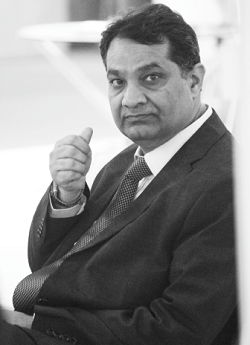National prosperity is created, not inherited. It does not grow out of a country’s natural endowments, its labor pool, its interest rates, or its currency’s value, as classical economics insists. These are just the symptoms of economic health.
A nation’s competitiveness depends on the capacity of its industry to innovate and upgrade and a discipline work force who could use the technology devised in the country. Additionally companies gain advantage against the world’s best competitors because of pressure and challenge. They benefit from having strong domestic rivals, aggressive home-based suppliers, and demanding local customers. In the center of all activities – it is the people – that is the Primum Mobile.

The statement is not the ‘worlds of wisdom’ as the words ostentatiously appear. It is rather an exasperation that all this while we have not achieved the desired results which we could have done.
During the last few months I visited quite a few nations that are known to dominate the electronics industry worldwide Viz. Germany, Japan and Taiwan.
My visit to their offices in these countries raised my curiosity level to delve further deep. At all the places one thing was most common than others – that the offices were like a serene and calm place personified with the sages working there. A kind of meditating workers, far away from the madding crowd, were enmeshed with writing the success story for their company, industry and the nation.
If we go by a copy book style of definition by a management perspective, it is a perfect Discipline. But to me they were the working sages – creating a nation to greatness. They seems to have imbibed and inherited the work culture of a discipline work force that India lacks so greatly.
India, since time immemorial, has been the seat of knowledge. Manifestation of Holi Gita and Vedas as the divine and ultimately philosophy on earth has indebted the human kind, but it lack short of the material comfort and prosperity to the country.
To portray India as industrialized country, brand India need to be projected aggressively as few people still believe that India is the same as it was 30 years ago.
Differences in national values, culture, economic structures, institutions, and histories all contribute to competitive success. There are striking differences in the patterns of competitiveness in every country. Ultimately, nations succeed in particular industries because the people and their work culture is the most forward-looking, dynamic, and challenging.
According to prevailing thinking, labor costs, interest rates, exchange rates, and economies of scale are the most potent determinants of competitiveness. In companies, the words of the day are merger, alliance, strategic partnerships, collaboration, and supranational globalization. After all ‘people passion’ has no substitute.
Around the world, companies that have achieved international leadership employ strategies that differ from each other in every respect. But while every successful company will employ its own particular strategy, the underlying mode of operation—the character and trajectory of all successful companies—is fundamentally pass through the sweat and passion of a worker.
In India enough has been done in formulating the policies, though it is a continual process, we need a new perspective and new tools—an approach to competitiveness that grows directly out of an analysis of internationally successful industries are the passionate people behind it. In the current phase where Indian Electronics Industry stands, we need to follow only the basic algorithm, that is, the ‘people and the passion’. This is the only emancipation. We need to know, very simply, what works and why. Policies, Infrastructure, technological know how, working capital, and the reforms will go on incessantly always, but it is the people turn now to create a history.
Amazingly Miraculous facts prove that Indians have earned laurels all over the world. Given the level playing field they can do wonders at home as well. Enjoy Reading ELE Times.








